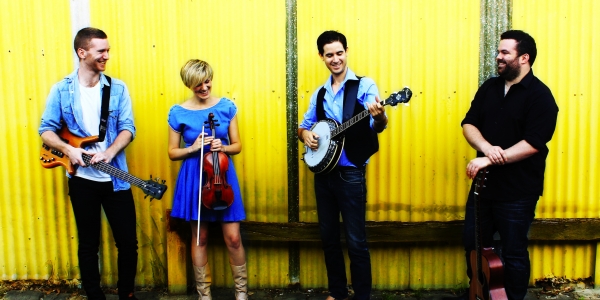Loveless doesn’t sound too traumatised by the memory. Things have obviously improved from there, and they’ve moved on from opening for a “space-metal wizard” to bands, including The Cribs and Deap Vally, and signed to Infectious for their debut album. They’ve played the Glastonbury Festival, where they impressed British politician Tom Watson so much he bizarrely name-checked them in his resignation letter, and the Roskilde Festival, where they confused locals by not being Danish in spite of being named after the Danish word for ‘boys’. Their name was chosen more for the way it sounded than anything else. “It’s quite nice to have a band name that doesn’t mean anything,” says Loveless, “that doesn’t have any imagery or connotations or anything. Like, it implies something but it’s not a band name that is really obvious in what the band’s gonna sound like.”
That said, if ‘dreng-ey’ was an adjective you could see it fitting the fuzzed-out, punky garage rock that Drenge play. If you can imagine Japandroids crossed with Tumbleweed, they sound a bit like that. Being a guitar-and-drums duo, you don’t have much choice but to play garage rock.
Loveless says they didn’t consider getting someone else to join them when they started out, and if they did now an outsider might struggle to fit in. “We’re quite hard to pin down for rehearsals or anything like that. When it’s a show we turn up for the show and play the show. I guess if we got someone else in they might not be used to the way we work but if we needed a bass player or we needed a keyboard player or something like that then we’d get one, but at the moment the songs that we’ve written are just for a two-piece.”
Those songs, cynical wasted-youth anthems with excellent titles like ‘People In Love Make Me Feel Yuck’ and ‘Necromance Is Dead’, begin as rough ideas of Eoin’s but then have to pass through “quality control” – which is what he calls his brother Rory – before being expanded on. “If it isn’t fine by him then we don’t do it.” Apparently, that happens a lot, “which is good because it stops it from being so self-defined. I like working that way because you’ve got this really honest opinion from someone else.”
The songs themselves don’t matter to Loveless so much as the opportunity to play them. “I get really excited before shows because we’ve got week-long gaps in between them, so I really want to get back to being on stage and playing music again,” he says. He’s impatient for their album to come out mainly because it’ll give them an excuse to tour again and an audience who know the songs better. “That’s the exciting thing for me. Those songs that we’ve been playing live for ages, and the more recognised we’ve got the more people are getting into the songs and the music, they still can’t get past the lyrics barrier. They’re hearing these songs for the first time if they come and see us live, but they’re kind of like dancing along and there’s this strained expression on their face while they try and understand what’s going on and see if there’s any lyrics they can pick out that get repeated. I’m just excited about when there’s this common ground between the crowd and us. I’m really looking forward to doing shows after people know the album a bit.”
The finale of that album is very different, a morbid slice-of-life that’s a bit slower and could easily be an Arctic Monkeys album track, with witty observational lyrics like, “When I put the kettle on / you put heavy metal on.” Loveless is looking forward to trying it out more often. “We don’t play that much because it doesn’t make sense in what we do as a band at the moment but when the album’s out that’ll hopefully make a bit more sense.” Even in the lyrics of that song he’s self-deprecating about the worth of his music, singing “This song is a fuckabout / not one to write home about.” He’s not particularly interested in the worth of his songs or even their popularity, beyond giving the two of them more audiences to play for. “I just like doing it because I get to hang out with my brother,” he admits, “I’m not too fussed about taking my own songs out there.”
BY JODY MACGREGOR







